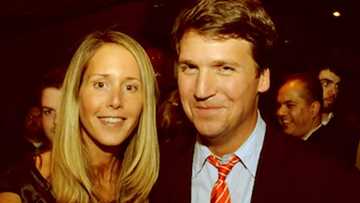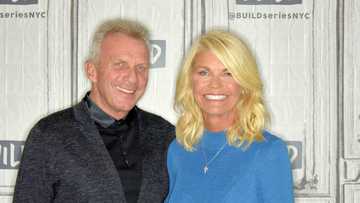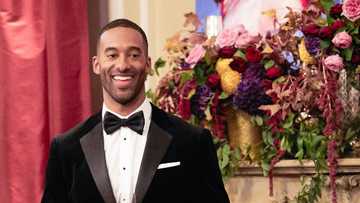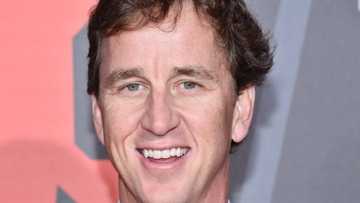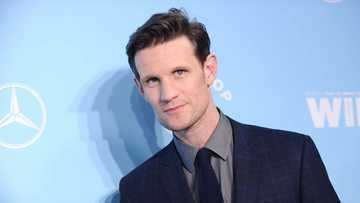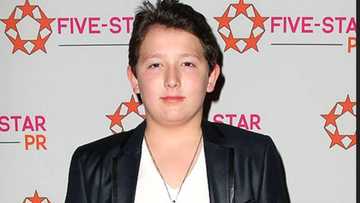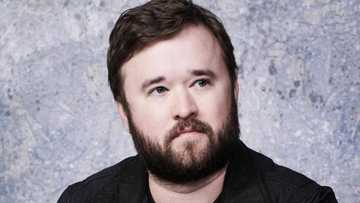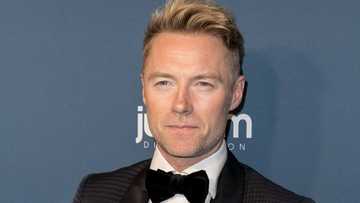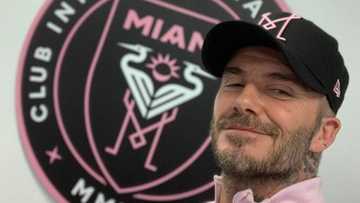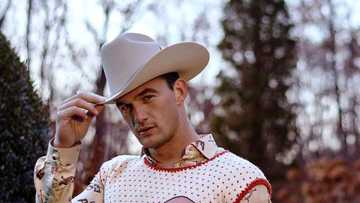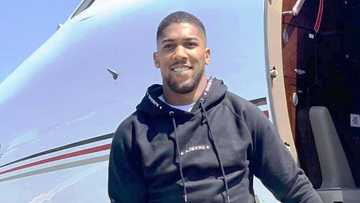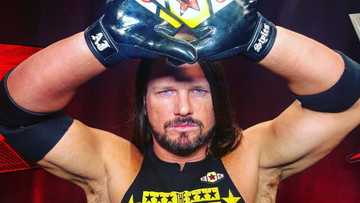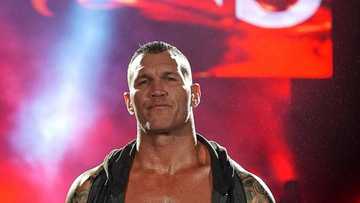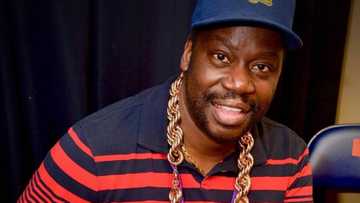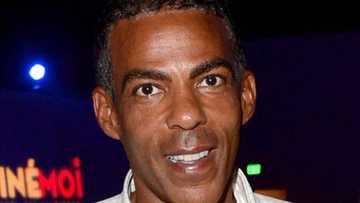Tim Duncan bio: wife, height, net worth, championships
Recently, Gregg Popovich's assistant in the San Antonio Spurs of the National Basketball Association (NBA) was announced, and he is none other than Tim Duncan. The new assistant coach is a seasoned athlete who played with the Spurs for close to two decades. Basketball lovers and fans of the San Antonio Spurs hope that he will spruce the team up and prepare it for many more wins in the upcoming basketball seasons.
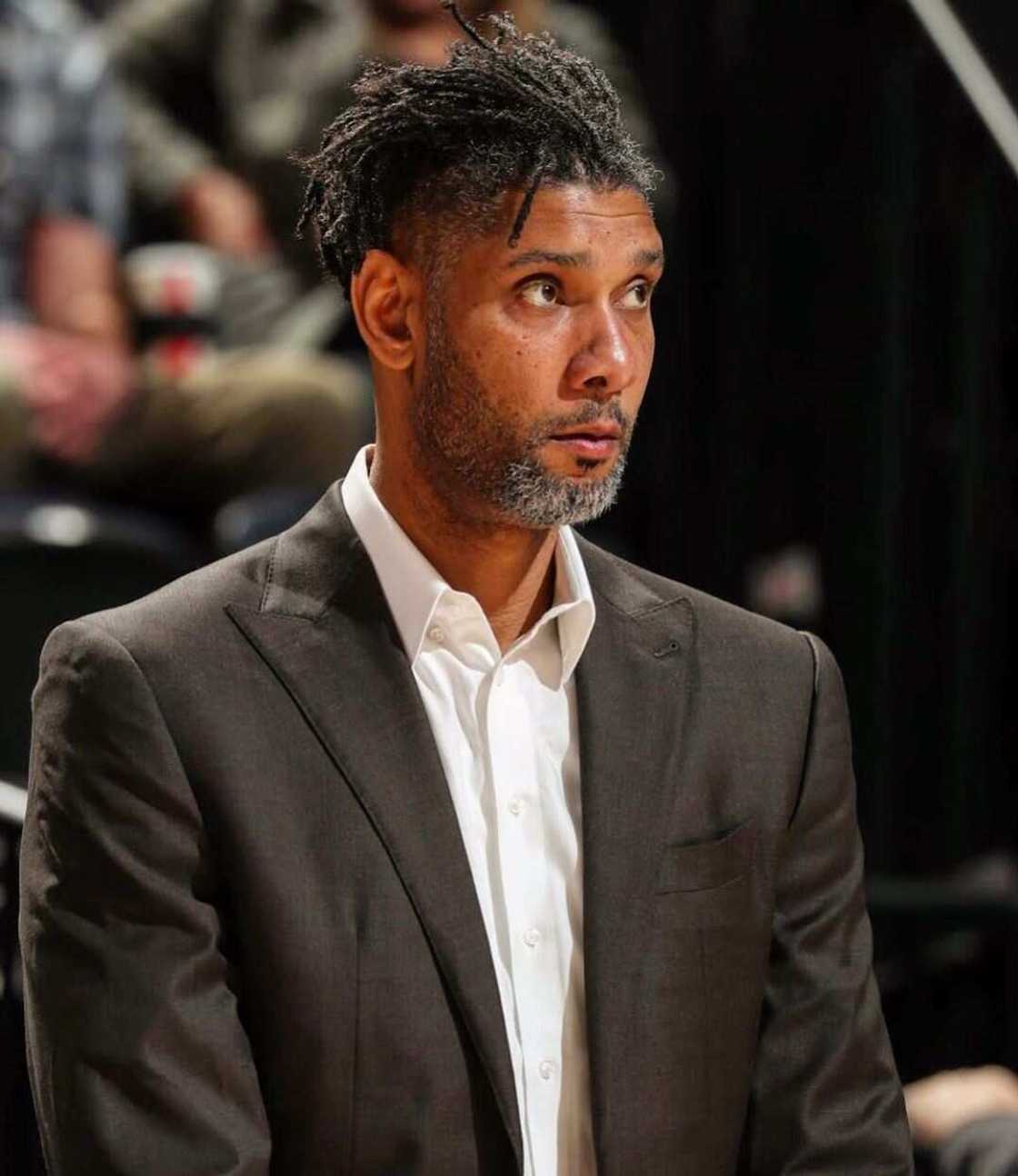
Source: Instagram
What does Tim Duncan do now? Most people know Tim Duncan coach from his days as a professional basketball player. However, he has since retired from playing and is currently working as a basketball coach.
His love for the game began when he was in ninth grade, and he has worked hard over the years to sharpen his skills and those of other young athletes. Will Tim Duncan boost the San Antonio Spurs performance in the coming years?
Profile summary
- Name: Timothy Theodore Duncan (commonly known as Tim Duncan)
- Age: 43 years
- Date of birth: 25th of April 1976
- Place of birth: Saint Croix, U.S. Virgin Islands
- Zodiac sign: Taurus
- Nationality: American
- Father: William Duncan
- Mother: Ione Duncan
- Sisters: Cheryl and Tricia
- Brother: Scott
- Ex-wife: Amy Sherrill (m. July 2001; d. August 2013)
- Girlfriend: Vanessa Macias
- Daughters: Sydney (b. 2005) and Quill (b. 2017)
- Son: Draven (b. 2007)
- Profession: Basketball coach and former basketball player
Tim Duncan family background
Timothy Theodore Duncan, who is commonly known as Tim Duncan, was born in Saint Croix, U.S. Virgin Islands, which is also where he was raised. His father, William, was a mason while his mother, Ione, was a professional midwife.
Tim Duncan birthday was on the 25th of April 1976, which means that he is currently 43 years old. On the 25th of April 2020, he will turn 44 years of age.
The union between William and Ione bore four children, and the American athlete is the last child. He has two older sisters whose names are Cheryl and Tricia. Initially, Cheryl was a champion swimmer before making a career transition into nursing, while Tricia represented the U.S. Virgin Islands during the 1988 Summer Olympics that were held in Seoul.
His older brother's name is Scott, who is a cinematographer and film director.
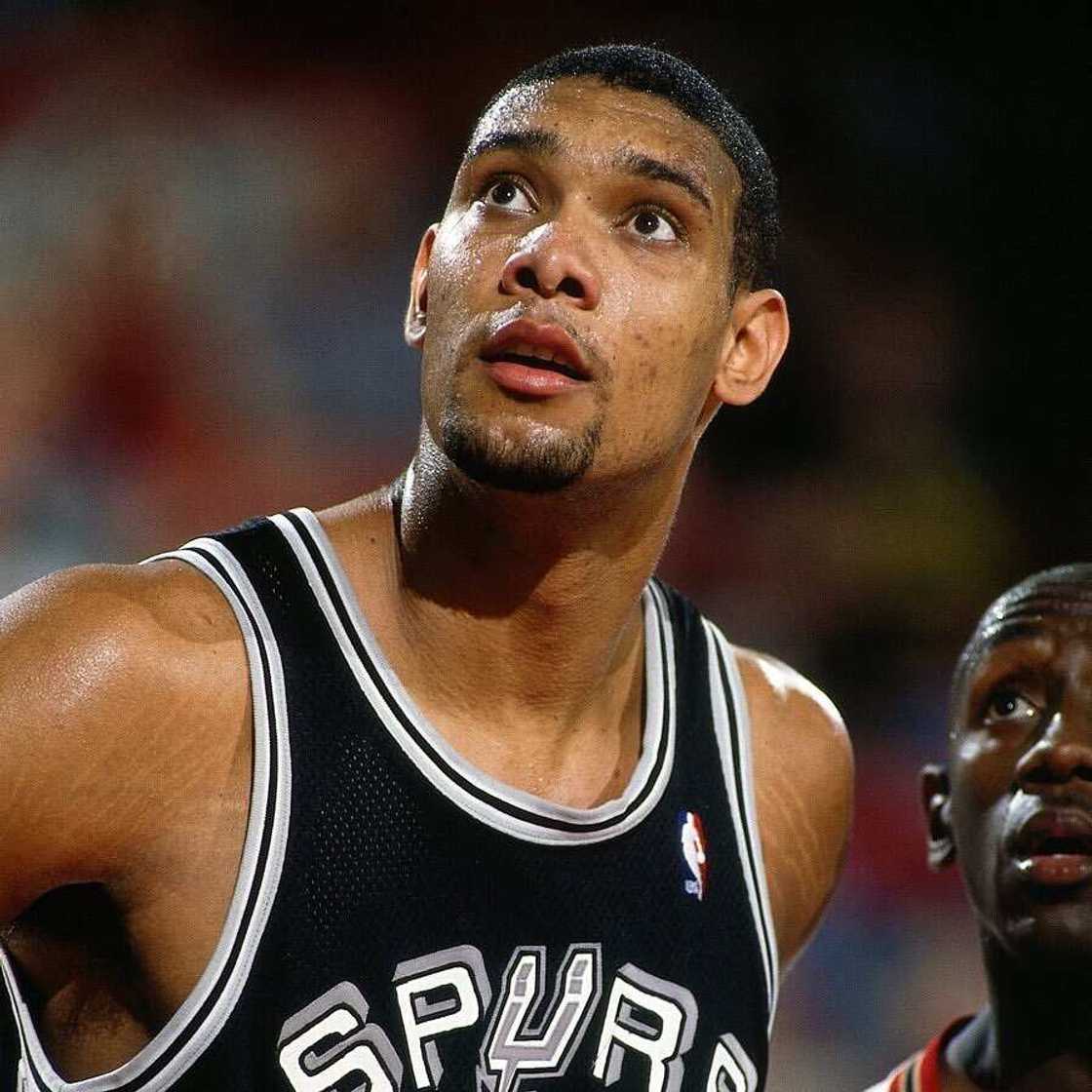
Source: Instagram
Early life
Growing up, the athlete desired to be an Olympic-level swimmer, just like Tricia, his older sister. William and Ione supported him the best way they could, and he became an excellent swimmer. He was the teenage standout freestyle swimmer in 50, 100, and 400 meters.
He aimed at representing the United States of America at the 1992 Olympic Games. His journey as a swimmer was not without challenges. His home area had only one Olympic-size swimming pool, which was destroyed by Hurricane Hugo in 1989.
The young swimmer was forced to practice swimming in the ocean. Unfortunately, his enthusiasm declined over time due to his fear of sharks. Shortly after, he was hit by another blow when his beloved mother lost her life to breast cancer when he was only 14 years old.
Before taking her last breath, Ione made the athlete promise her that he would graduate from college with a degree. After the two catastrophic events in his young life, Theodore stopped swimming competitively. He was a bright student in class, so he put more attention into his education.
He only developed an interest in basketball in ninth grade after his brother-in-law encouraged him to try it out. At first, he struggled to adapt and adjust to the rules of the game. He was merely playing to relieve his frustrations in life.
Although he was terrible in his early days in the game, he improved and eventually became one of the top athletes in the St. Dunstan's Episcopal High School team. His skills even attracted the attention of several universities.
Dave Odom, a coach from Wake Forest University, was particularly interested in him after watching him playing a pick-up game with NBA star Alonzo Mourning, and the two drew 5-5.
Dave Odom was at the time looking for a tall athlete, and the then 16-year-old Theodore was a perfect match. Odom talked with the young man, and he initially got the impression that Theodore was inattentive. Later, he realized that he was a fast learner who was also a good listener.
Education
The athlete went to St. Dunstan's Episcopal for his high school education. College scholarship offers from the University of Delaware, Providence College and The University of Hartford came in for the athlete, but he chose to join Wake Forest University, where he played in Odom's Wake Forest Demon Deacons.
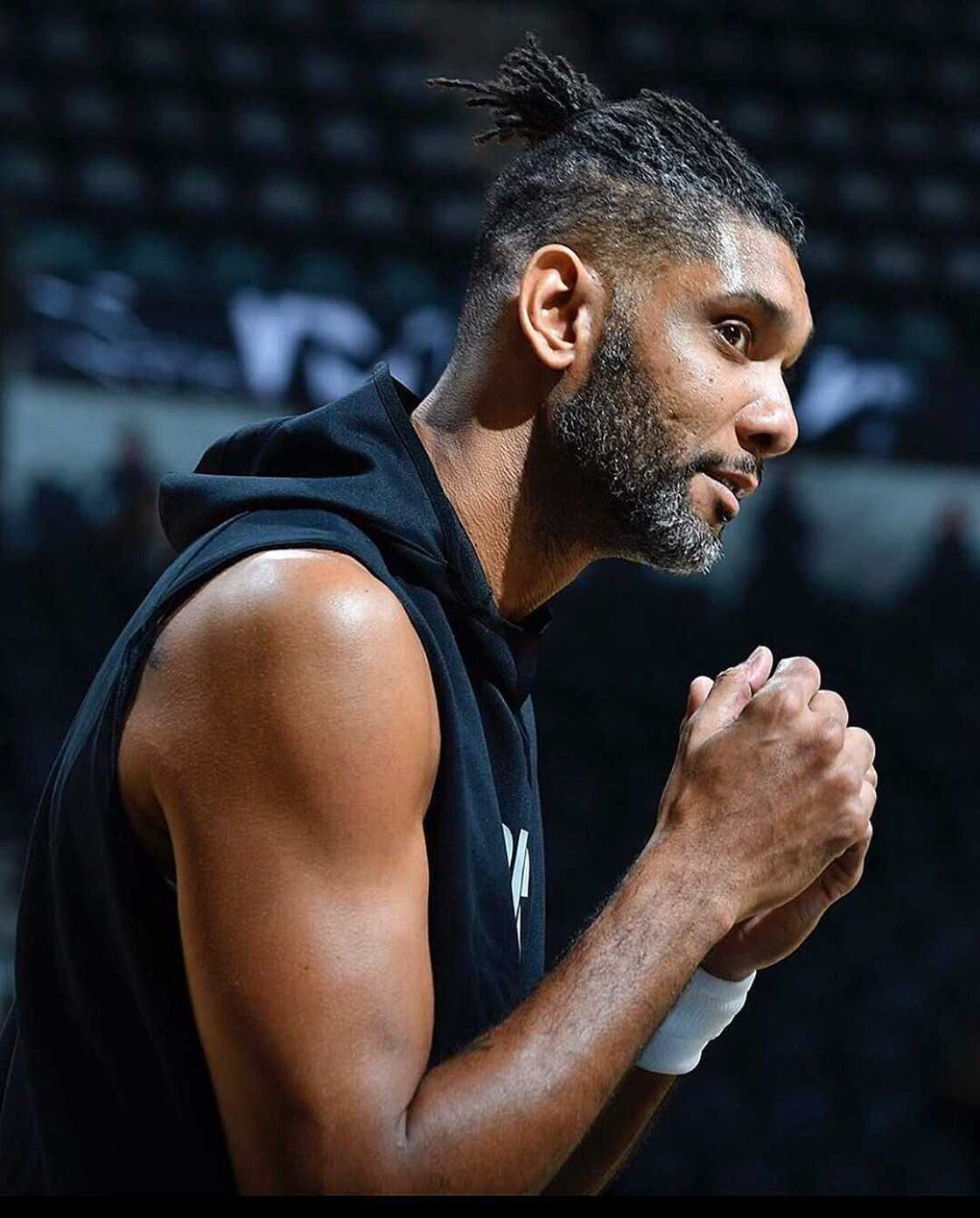
Source: Instagram
In college, he pursued a Bachelor's degree in Psychology, and he also took Chinese literature and anthropology classes. He co-authored a chapter in Aversive Interpersonal Behaviors, which is a sociology book while he was still a student.
In his senior year of college, the athlete was crowned with three awards which were;
- Naismith College Player of the Year
- John Wooden Award
- USBWA College Player of the Year
Tim Duncan height and body statistics
The basketball coach is 6 feet 11 inches (2.11 meters/ 211 centimeters) tall, and his weight is about 113 kilograms (250 lbs.) After retiring as a professional basketball athlete, Tim Duncan hair change caused a lot of excitement online.
After almost 20 years of having the same short hairstyle, he decided to change his haircut into a bob with a rugged front.
Career
Before becoming the assistant coach of Spurs, Theodore was a basketballer who started taking his job more seriously in his college years. He played in his college team before becoming a sought-after professional basketball player in the NBA. What was his position?
Tim Duncan position
In his years as a basketballer, Tim Duncan stats were impressive. He played the power forward position, and could also play the center. In his prime, he was considered one of the most consistent players ever.
He was an excellent defender who was ranked top in the lists of best scorers, shot-blockers, and rebounders in the NBA. He also proved to be a fantastic clutch player who won the NBA Finals MVP awards thrice. His power and versatility made him of the best power forwards in NBA history.
All through his playing years, he used simple strategies to win. Some of his critics thought that his simple moves were boring. However, it was his ability to remain calm and focussed that earned him a good reputation among his fans.
The athlete has previously said that his inspiration in life is his late mother and that his motto is Good, Better, Best. Never let it rest / Until your Good is Better, and your Better is your Best from a nursery rhyme.
His core values are teamwork, dedication, and camaraderie. As a basketball athlete, he chose jersey number 21 in honor of his brother in law who inspired him to become a basketball player.
College years
Tim Duncan college years were filled with success in basketball. Just before he joined Wake Forest University, the Demon Deacons had lost one of its key players, Rodney Rogers, to the NBA draft.
In the 1993-1994 season, Tim Duncan head coach, Odom, was forced to name him a key athlete after Makhtar N'Diaye transferred to Michigan. In his debut game with the Demon Deacons, Theodore struggled a lot and did not make any score. He soon adjusted and became an invaluable member of the Demon Deacons.
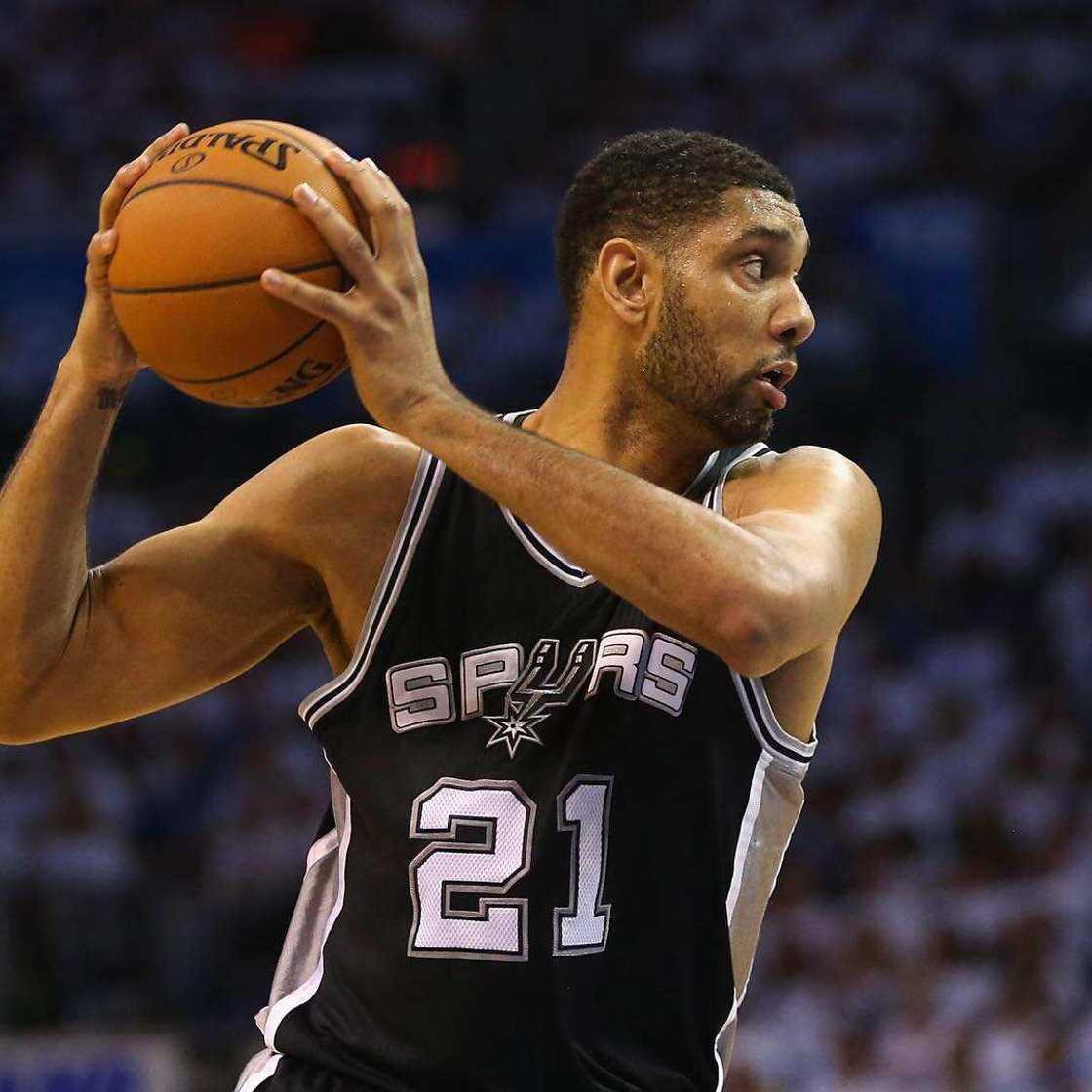
Source: Instagram
What made Tim Duncan so good? Well, he used a simple strategy that involved combining different low-post moves, tough defense, and mid-range bank shots. By 1994, he was so good that he was selected to represent the United States of America in the Goodwill Games.
He was a stoic athlete who was nicknamed Mr. Spock by his peers. While he was very dedicated to this basketball team, Theodore also paid much attention to his school work. He was determined to fulfill the promise that he made to his mother on her death bed.
In the 1994-1995 NCAA season, he was named as one of the candidates who were eligible to join the NBS alongside Jerry Stackhouse, Joe Smith, and Rasheed Wallace. Jerry West, the then general manager of Los Angeles Lakers, suggested Theodore as the beck pick for the 1995 NBA draft.
However, the athlete declined the offer, and categorically stated that he would not join the NBA before graduating with a college degree as he promised his late mother. He forwent a lot of money when he made this decision.
He continued playing with the Demon Deacons and led his squad to the Atlantic Coast Conference (ACC) championship game. The squad faced the North Carolina Tar Heels that was led by Rasheed Wallace. Demon Deacons won.
The next game was against Oklahoma State, and the basketballer scored 12 points. He also managed eight blocks and 22 rebounds. Even so, his squad lost 71-66. At the end of the season, he had an average of 16.8 points and was named the Defensive Player of the Year.
He also got votes into the All-ACC First Team that year and in the subsequent two years. In the 1995- 1996 NCAA season, Theodore became the leader of the team after Childress graduated the previous season. Under his leadership, the squad won all but four games in the entire ACC season.
He then caught the flu, so his squad missed the Final Four. He averaged 19.1 points in the season and was named the ACC Defensive Player of the Year and also bagged his first-ever first ACC Player of the Year award.
In the 1996- 1997 NCAA season, Loren Woods joined Demon Deacons and eased the pressure that Theodore had in the team. The duo led other members to all wins in the first 13 games. Unfortunately, the team did not win the ACC title.
At the end of the season, Tim Duncan all time points averaged 20.8 points, 3.2 assists and 14.7 rebounds per game, and he was named the Defensive Player of the Year for the third time. Overall, the athlete led his squad to a 97–31 win-loss record in his college career.
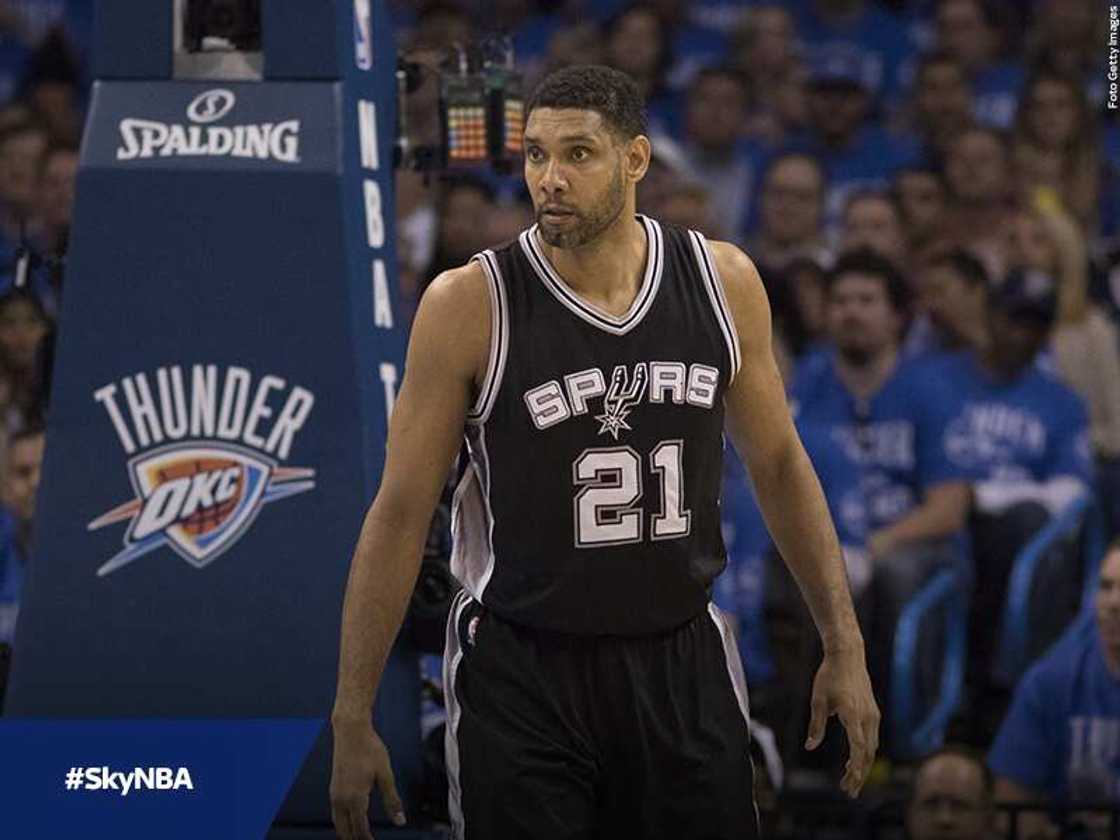
Source: Facebook
Professional career
After graduating from college, the athlete was eligible for the 1997 NBA draft. He won the NBA Rookie of the Year after San Antonio Spurs chose him as the first overall pick in the draft. The athlete joined the squad after a 20–62 win-loss record in the 1996-1997 season.
The Spurs' best athlete, David Robinson, worked closely with Theodore, and the duo became known as the Twin Towers, who were excellent defenders. In his second game, he faced and opposed multiple champion Dennis Rodman, and he made 22 rebounds.
He was then voted to the 1998 NBA All-Star Game. In the group's next game, he faced and opposed power forward Charles Barkley from Houston Rockets, and Barkley later admitted that he was impressed by Theodore.
In his rookie season, the athlete featured in 82 regular season matches, and he averaged 21.1 points, 2.7 assists, 11.9 rebounds, and 2.5 blocks. These stats earned him the All-NBA First Team honors, he became the NBA Rookie of the Year and was also elected to the NBA All-Defensive Second Team.
The Spurs then lost to Utah Jazz in the 1998 NBA Playoffs after Theodore had a rough start in the tournaments. In the lockout-shortened 1998- 1999 season, the Twin Towers did their best, and by the end, the San Antonio Spurs concluded the season with a 31–5 run.
During the 1999 NBA Playoffs, The Spurs defeated the Minnesota Timberwolves, Portland Trail Blazers, Los Angeles Lakers, and Cinderella story Kicks. Their stats left numerous people impressed.
In the subsequent season, his performance was stellar. However, Theodore sustained an injury on his meniscus shortly after, so he did not participate in the post-season tournaments. As a result, his team was eliminated from the 2000 NBA Playoffs after losing to the Phoenix Suns.
He came back the next season with a burning desire for success, and he was named to the All-NBA and All-Defensive First Teams. Unfortunately, the San Antonio Spurs squad lost to the Lakers in the 2001 NBA Playoffs. After this loss, he worked hard to ensure that his squad performed better in the subsequent seasons.
Leadership role
Right before the commencement of the 2003- 2004 season, captain David Robinson retired, and Theodore became the leader of the Spurs. He worked well with other key persons such as Rasho Nesterovič, Bruce Bowen, and Ginóbili. Initially, he was reluctant to take over from Robinson, but he eventually became a strong and reliable leader.
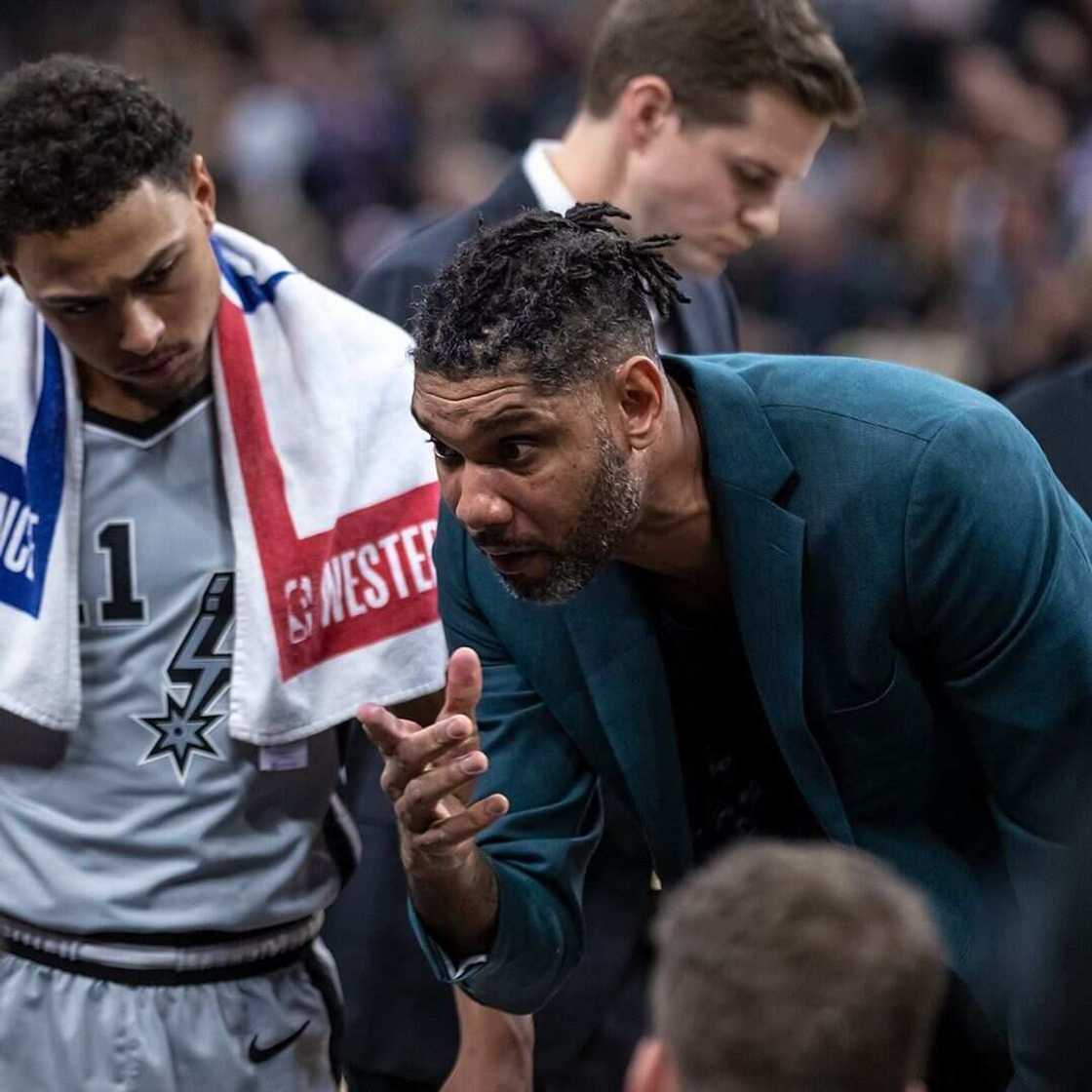
Source: Instagram
In the Western Conference Semifinals, the San Antonio Spurs squad faced the Lakers, but it lost 4-2 after putting up a spirited fight. The loss forced the captain and other team members to re-assert themselves for the 2004-2005 season.
The Spurs performed much better in this season and earned a spot to the 2005 NBA Finals against Detroit Pistons. After a tough fight, the Spurs defeated the Pistons, and the captain won the NBA Finals MVP Award for the third time.
In the 2005-2006 season, Theodore performed poorly after suffering from plantar fasciitis. He, however, bounced back in the 2006 NBA Playoffs against the Dallas Mavericks and put up a very tough fight. Despite his efforts, his squad lost to the Mavericks.
In the next season, he made an average of 20.0 points, 3.4 assists, 10.6 rebounds, and 2.4 blocks per game. These stats garnered a lot of praise and respect for Theodore. He continued to play in the same team for many more years. Throughout the years, there were many wins as well as losses.
The Fifth championship
On the 2nd of December 2013, Theodore made history by becoming the oldest athlete in NBA history to record a 20–20 match. He finished with 23 points and 21 rebounds in the game against Atlanta Hawks.
In the 2013–14 regular season, the Spurs recorded 62 wins. After the win, he was named the second player in history to win a championship in three different decades. The other player to hold such a record is John Salley.
An end to playing
On the 23rd of June 2014, Theodore decided to exercise his $10.3 million player option for the next season. He scored his 25,000th point in a game against the Los Angeles Lakers in which the Spurs won.
This milestone made him the 19th person in NBA history to achieve such a feat. He continued making impressive records and played his 1,330th game against Phoenix Suns. On the 20th of May that year, he was named to the All-Defensive second team for the seventh time.
On the 9th of July 2015, he signed a two-year deal with the Spurs. He continued making impressive stats in his games. In December that year, he missed out on three games due to sore knees.
He returned on the 2nd of January 2016 in a game against the Houston Rockets. That was the first time in his career not to score anything by the end of the game. Four days later, he scored 18 points in a game against Utah Jazz in which the Spurs won.
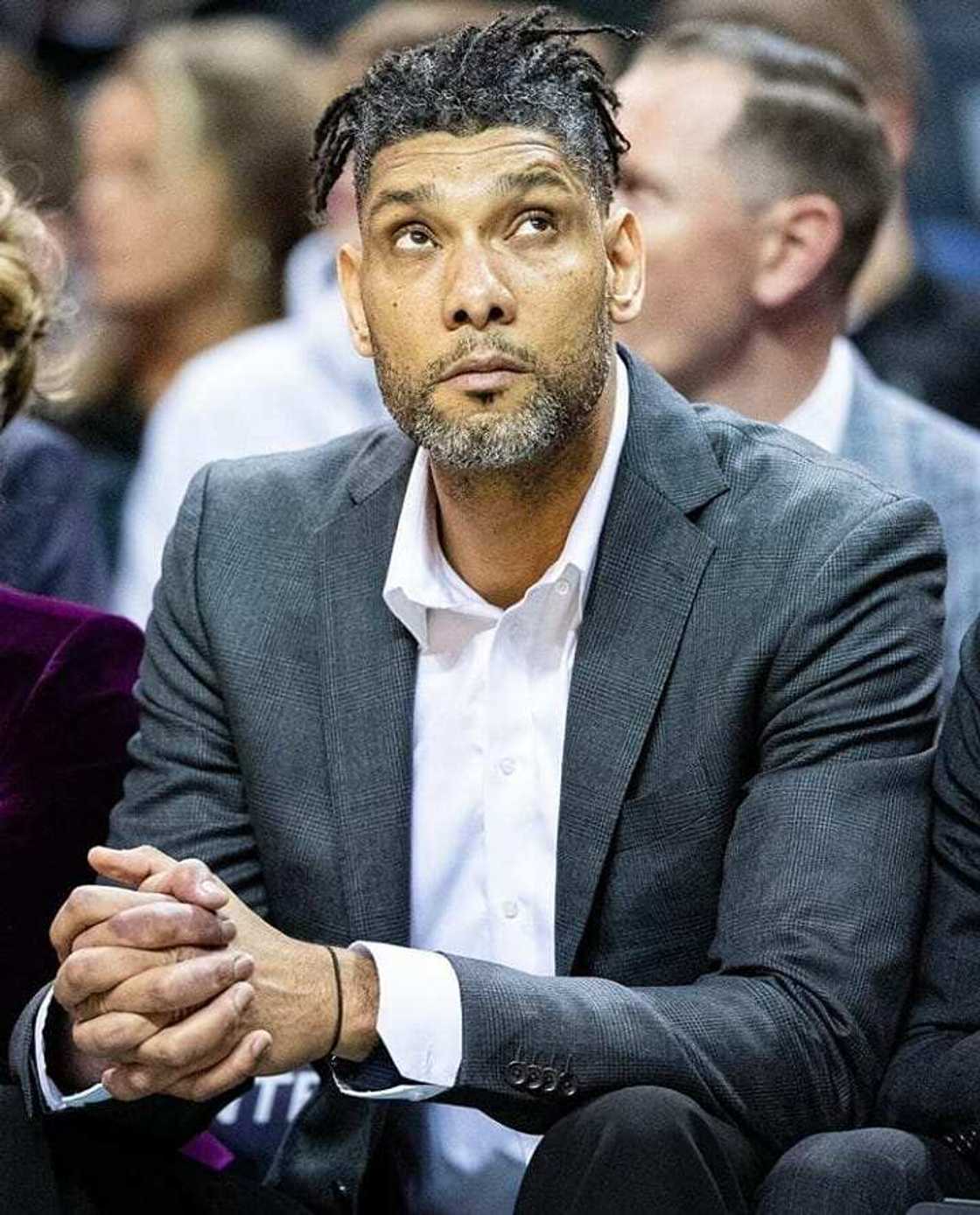
Source: Instagram
Theodore then missed eight games due to a sore knee, but he returned to the basketball court on the 10th of February. Like before, he continued wowing his fans and followers with an impressive personal performance.
On the 28th of June, 2016, he signed a $5.6 million contract for the 2016-2017 season. However, he announced on the 11th of July 2016 that he would be retiring from the NBA after 19 years.
On the 18th of December 2016, the San Antonio Spurs officially retired the No. 21 jersey in a game that was held after a match. He became the eighth member of the Spurs to retire his jersey.
Did he play in the United States national team?
In 1998, Theodore was selected to join the United States national team to represent the country in the World Basketball Championship. However, this was not to be because of the NBA lockout, so his team was replaced with another.
In 1999, he made the list of the Olympic Qualifying Team. Although he qualified for the 2000 Sydney Olympics, a knee-injury barred him from playing. In 2003, he was part of the USA team at the 2004 Summer Olympics. The group lost three games and went back home with a bronze medal.
Career as a coach
The former basketballer is currently an assistant coach of the team he played for. He was named the assistance coach of San Antonio Spurs on the 22nd of July 2019. Since then, he has been working closely with the current squad members to ensure that the San Antonio Spurs soar to higher heights in the world of basketball.
Tim Duncan accolades
In his career as a basketballer, Theodore has received many accolades and honors. Some were received as an individual while others were together with his squad-mates. He made history as the sole NBA player to receive All-NBA and All-Defensive honors in all his first 13 seasons.
Some of his awards and accolades are;
- In his college days, he was named the ACC Male Athlete of the Year by the House of Representatives, he won the Adolph Rupp Trophy, John R. Wooden Award and was named the Naismith College Player of the Year.
- In 2002 and 2003, he was named the Most Valuable Player (MVP.)
- In 1999, 2003, 2005, 2007 and 2014, he was named the NBA Champion.
- In 1998, he was voted Rookie of the Year and was voted into the All-Rookie Team.
- He was named to 15 NBA All-Star Teams, 15 All-Defensive Teams, and 15 All-NBA Teams in different years.
- He was named on the list of 100 Greatest Professional Basketball Players of The 20th Century by the Association for Professional Basketball Research.
- In 2009, he was ranked at position eight by Slam Magazine in its list of the Top 50 NBA players of All Time.
- He was named the NBA Player of the Decade by Sports Illustrated.
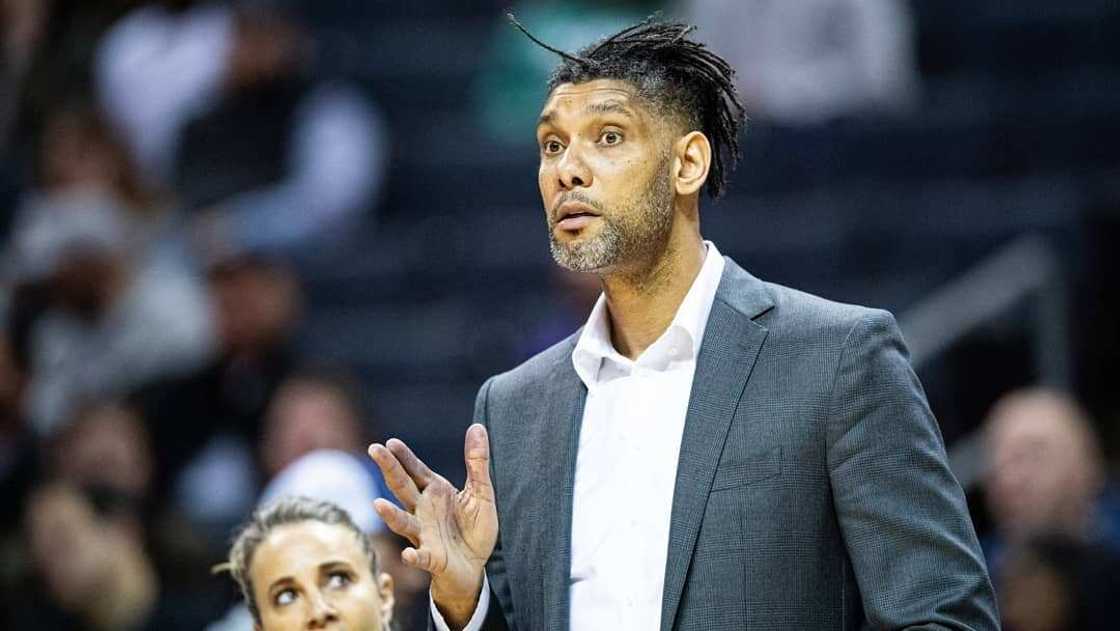
Source: Instagram
Personal ventures and philanthropy
The athlete founded the Tim Duncan Foundation, which aims at creating health awareness among people. It also funds youth sports and education programs. Some of the major events run by the foundation are Slam Duncan Charity Golf Classic and the Tim Duncan Bowling for Dollar$ Charity Bowl-A-Thon.
The foundation raised $350,000 between 2001 and 2002 to support breast and prostate cancer research. He also runs the BlackJack Speed Shop that is located in San Antonio, Texas, close to the San Antonio Spurs practice area.
The shop deals with vehicle customization. After Hurricane Harvey struck, the Tim Duncan Foundation and the BlackJack Speed Shop joined efforts to provide supplies for the affected people.
The assistant coach has in the past supported the Children's Center of San Antonio, the Children's Bereavement Center, and the Cancer Therapy and Research Center.
What is the net worth of Tim Duncan?
From his time with the Spurs as a player, the coach amassed wealth and riches that facilitate his luxurious life. Currently, Tim Duncan net worth is estimated at $130 million. His salary is estimated to be about $10 million annually.
Tim Duncan wife and children
Besides the Tim Duncan championships, which have made him famous, the Spurs assistant coach is a family man. In July 2001, he married Amy Sherrill. There are two Tim Duncan kids from this union.
In the summer of 2005, the two welcomed their first daughter, whose name is Sydney. In the summer of 2005, they welcomed a son named Draven. Unfortunately, the couple's marriage ended in August 2013 when their divorce was finalized.
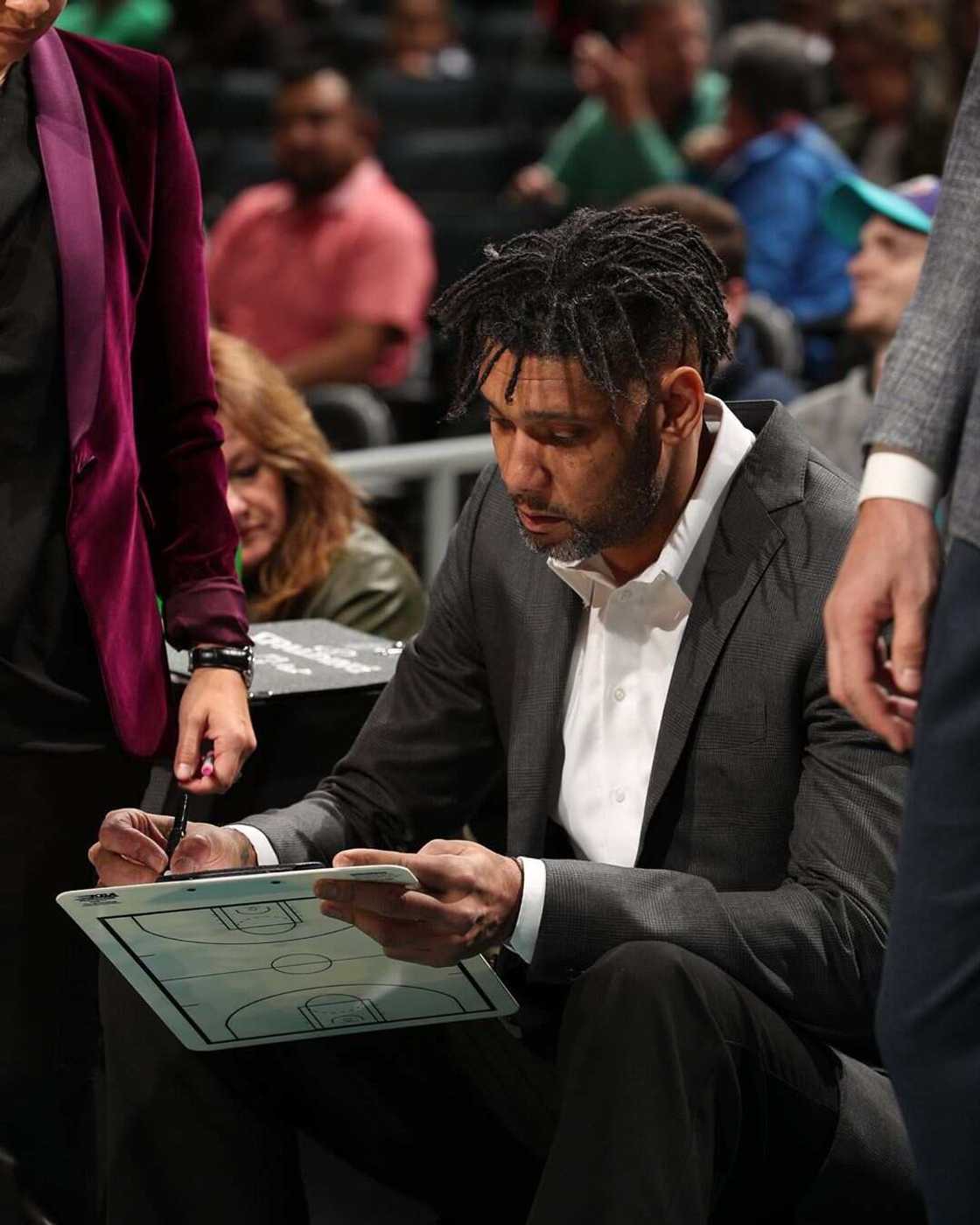
Source: Instagram
After the divorce, the assistant coach has been in a long-term relationship with Vanessa Macias. Vanessa gave birth to his second daughter, Quill, in 2017.
Duncan vs. investment adviser
The assistant coach sued his investment adviser in 2015, where he claimed over $20 million in losses. In September the following year, the adviser was indicted on two accounts of wire fraud connected to the case.
In April 2017, the adviser pleaded guilty, and in June the following year, a settlement of $7.5 million was reached.
Social media
Although Tim Duncan pictures are readily available from different social media platforms, the Spurs assistant coach does not seem to have verified social media accounts yet. In his free time, the assistant coach enjoys playing Dungeons & Dragons and going to renaissance fairs.
Tim Duncan, who is the current assistant coach of San Antonio Spurs, was a former player with the team. In his years as a power forward and center, he had impressive records.
Today, Tim Duncan is giving back to the team in which he played for close to two decades. His career life inspires so many aspiring basketball players to always do their best to achieve their dreams and goals in life.
Source: Legit.ng


